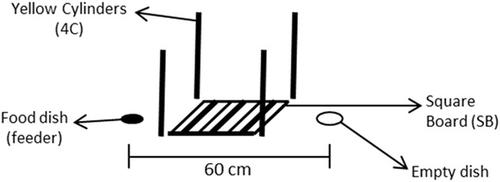当前位置:
X-MOL 学术
›
Insect Sci.
›
论文详情
Our official English website, www.x-mol.net, welcomes your feedback! (Note: you will need to create a separate account there.)
Evidence of associative blocking during foraging in the social wasp Vespula germanica
Insect Science ( IF 4 ) Pub Date : 2020-06-28 , DOI: 10.1111/1744-7917.12845 Sabrina Moreyra 1 , Paola D'Adamo 1 , Mariana Lozada 1
Insect Science ( IF 4 ) Pub Date : 2020-06-28 , DOI: 10.1111/1744-7917.12845 Sabrina Moreyra 1 , Paola D'Adamo 1 , Mariana Lozada 1
Affiliation

|
While foraging, Vespula germanica usually return to abundant food sites. During this relocation behavior, these wasps learn to identify contextual cues associated with food position. We analyzed associative blocking in this species, that is, how an association with a conditioned stimulus (CS1) blocks subsequent learning when a novel stimulus (CS2) is added on a second foraging visit. Three groups of wasps (A, B, and C; total 74 individual wasps) were observed while collecting meat during one or two consecutive visits. In group A, an environmental cue (CS1) was paired with food placed at a specific site, and on the second visit, a second cue (CS2) was added while food remained in the same position. In a subsequent testing phase, CS1 was removed and the food source displaced nearby. We then recorded the number of hovers performed over the empty dish (previously baited). Group A wasps appeared to ignore the addition of CS2 on their second visit because they performed fewer hovers over the learned site. For group A, the duration of the decision-making process to finally fly toward the baited dish was shorter than when CS1 and CS2 were presented together on their first visit (group B). This is the first study to demonstrate the occurrence of associative blocking in vespids, confirming that a prior foraging experience influences subsequent food relocation in V. germanica. Our findings reveal that first learning episodes block further associations with novel contextual cues, contributing to understanding of complex cognitive processes involved in V. germanica´s foraging behavior.
中文翻译:

社会黄蜂 Vespula Germanica 在觅食过程中发生联想阻滞的证据
觅食时,德国胡蜂通常返回丰富的食物场所。在这种重新定位行为期间,这些黄蜂学会识别与食物位置相关的上下文线索。我们分析了该物种的联想阻塞,即在第二次觅食访问中添加新刺激 (CS2) 时,与条件刺激 (CS1) 的关联如何阻止后续学习。在连续一两次访问期间收集肉时观察到三组黄蜂(A、B 和 C;总共 74 只黄蜂)。在 A 组中,环境提示 (CS1) 与放置在特定位置的食物配对,第二次访问时,添加第二个提示 (CS2),同时食物保持在同一位置。在随后的测试阶段,CS1 被移除,附近的食物来源被转移。然后我们记录了在空盘子(以前用过诱饵)上悬停的次数。A 组黄蜂似乎在第二次访问时忽略了 CS2 的添加,因为它们在学习站点上的悬停次数较少。对于 A 组,最终飞向诱饵盘的决策过程的持续时间比第一次访问时 CS1 和 CS2 一起出现时(B 组)要短。这是第一项证明胡蜂发生联想阻滞的研究,证实了先前的觅食经历会影响随后的食物迁移五、德国。我们的研究结果表明,第一次学习事件阻止了与新的上下文线索的进一步关联,有助于理解V. Germanica觅食行为所涉及的复杂认知过程。
更新日期:2020-06-28
中文翻译:

社会黄蜂 Vespula Germanica 在觅食过程中发生联想阻滞的证据
觅食时,德国胡蜂通常返回丰富的食物场所。在这种重新定位行为期间,这些黄蜂学会识别与食物位置相关的上下文线索。我们分析了该物种的联想阻塞,即在第二次觅食访问中添加新刺激 (CS2) 时,与条件刺激 (CS1) 的关联如何阻止后续学习。在连续一两次访问期间收集肉时观察到三组黄蜂(A、B 和 C;总共 74 只黄蜂)。在 A 组中,环境提示 (CS1) 与放置在特定位置的食物配对,第二次访问时,添加第二个提示 (CS2),同时食物保持在同一位置。在随后的测试阶段,CS1 被移除,附近的食物来源被转移。然后我们记录了在空盘子(以前用过诱饵)上悬停的次数。A 组黄蜂似乎在第二次访问时忽略了 CS2 的添加,因为它们在学习站点上的悬停次数较少。对于 A 组,最终飞向诱饵盘的决策过程的持续时间比第一次访问时 CS1 和 CS2 一起出现时(B 组)要短。这是第一项证明胡蜂发生联想阻滞的研究,证实了先前的觅食经历会影响随后的食物迁移五、德国。我们的研究结果表明,第一次学习事件阻止了与新的上下文线索的进一步关联,有助于理解V. Germanica觅食行为所涉及的复杂认知过程。



























 京公网安备 11010802027423号
京公网安备 11010802027423号